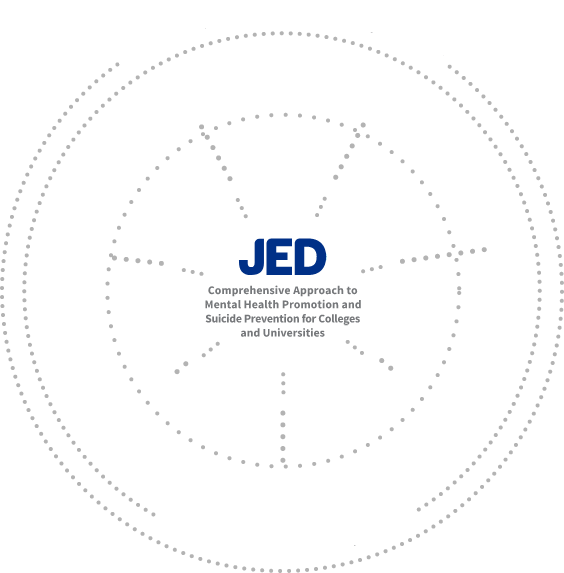What We Do
JED equips America’s teens and young adults with the skills and support they need to grow into healthy, thriving adults.
Mental health impacts all aspects of our lives — school, work, home life, relationships, and our overall well-being. Supporting and protecting mental health during the challenging transition from the teenage years to adulthood requires a comprehensive approach that addresses all the factors that can impact how we think, feel and perceive the world around us.
JED’s portfolio of programs is designed to target all of these areas, making it most likely we can change lives, save lives and help young people thrive.
Our Three Areas of Focus
Equipping Individuals
Research shows that building resiliency and life skills, promoting social connectedness, and encouraging help-seeking and help-giving behaviors in teens and young adults supports their overall well-being, helps them thrive, and protects their emotional health, making it less likely they’ll fall into unhealthy behaviors. JED uses digital campaigns, the media, and partnerships to engage teens and young adults where they are and in a way they’ll understand.
Strengthening Schools
For students, their school community is a critical part of their support network and emotional safety net. JED works directly with high schools, colleges, and universities — representing millions of students — to put systems, programs, and policies in place to create a culture of caring that protects student mental health, builds life skills, and makes it more likely students will seek help and struggling students will be recognized, connected to mental health care, and supported.
Mobilizing Communities
Our mental health is impacted by the world around us. There are a range of factors that can influence the perspective, well-being, and behaviors of our teens and young adults including families, friends, media, and high-profile voices. JED partners with these communities to create a culture of caring, grounded in deeper understanding and reduced shame and secrecy, and to collaborate on amplifying their positive impact while minimizing potential harm.
Our
Comprehensive
Approach
We at The Jed Foundation believe in a comprehensive, public health approach to promoting mental health and preventing suicide. JED’s programs are grounded in our Comprehensive Approach to Mental Health Promotion and Suicide Prevention for Colleges and Universities and for High Schools. These evidence-based models can be used to assess efforts currently being made in schools, identifying existing strengths and areas for improvement.
The programs and resources recommended through the JED Higher Education and JED High School programs have been developed with an equitable implementation lens that ensures that the needs of students who are potentially marginalized and/or underserved due to societal and structural inequities and school-specific community demographics are considered deliberately and intentionally.
Well-documented inequities place many students at incremental risk for emotional distress and suicidality. Populations of young adults may face different — and often additive — mental health stressors due to bias, racism and related microaggressions, financial disparities, and other social determinants of mental health. These contribute to higher-than-average and/or rising mental health challenges and suicide rates for people of color and LGBTQ+ youth and young adults, among other groups. To promote student mental health equitably and effectively, and to reduce risk, schools must take care to learn about, understand, and plan for the needs of students whose mental health may be impacted by bias, racism, and marginalization.
JED Colleges and Universities
Comprehensive Approach


Develop
life skills
Develop
life skills
Supporting life skills education is valuable in teaching healthy ways to cope with the stress of college life. Some of the life skills that are important to a student’s well-being include managing friendships and relationships, problem solving, decision making, identifying and managing emotions, healthy living, and finding life purpose, meaning and identity.

Promote social connectedness
Promote social connectedness
Research has shown that loneliness and isolation are significant risk factors for mental health problems and/or suicidal behavior. Therefore, supportive social relationships and feeling connected to campus, family and friends are protective factors that can help lower risk.

Identify
students
at risk
Identify
students
at risk
It is important to take action to identify students at risk for mental health problems and/or suicidal behavior, and also to promote emotional health awareness among those who interact with students the most — such as residence hall staff, academic advisors, faculty and even fellow students — as it is vital for these people to be able to recognize and refer a student who might be in distress.

Increase
help-seeking
behavior
Increase
help-seeking
behavior
Many students who need help may be reluctant or unsure of how to seek it out. Obstacles to help-seeking include lack of awareness of mental health services, skepticism about the effectiveness of treatment, prejudices associated with mental illness, and uncertainty about costs or insurance coverage. Campuses should engage in a variety of activities designed to increase the likelihood that a student in need will seek help.

Provide mental health and substance abuse services
Provide mental health and substance abuse services
It is essential to offer accessible, consistent and high-quality mental health services to students. To make mental health and substance abuse care more comprehensive, it should include strong and flexible services, adequate staffing levels and staff diversity reflective of the student population, flexibility in treatment approaches, and clinic hours that are reflective of student schedules. Since most college clinics are free, the length of treatment is often limited. Therefore, it is important that campus mental health services can assist students in finding off-campus resources that can provide long-term care if needed.

Follow crisis management procedures
Follow crisis management procedures
The campus should have access to a well-publicized 24/7 crisis phone and/or chat line either through campus resources or local/national services. There should be a process in place to share information (as legally appropriate) between local ERs and school health and/or counseling services.

Promote means safety
Promote means safety
It has been well established that if the means to self-harm are removed or limited in an environment, it can prevent suicide and even limit accidental deaths. This is called “means restriction.” Limiting students’ access to weapons, poisonous chemicals and rooftops, windows or other high places are all means restriction activities. Each campus should do an environmental scan for potential access to lethal or dangerous means.
JED High Schools
Comprehensive Approach


Develop
life skills
Develop
life skills
The development of fundamental life skills and social and emotional learning is one of the most powerful ways to build resilience, protect mental health, and thus reduce suicide risk in youth. Educational focus on the development of life and coping skills has been found to reduce symptoms of anxiety and depression, reduce substance misuse, and reduce suicide risk.

Promote social connectedness and a positive school climate
Promote social connectedness and a positive school climate
Loneliness and isolation, including experiences of being bullied or marginalized, are significant risk factors for mental health problems and/or suicidal behavior. Adolescents who feel connected to others, cared for by others, and a sense of belonging in their school community are less likely to experience emotional distress or suicidal ideation, and are less likely to engage in substance misuse or suicide attempts.

Encourage help-seeking behaviors
Encourage help-seeking behaviors
Many students may be reluctant or uncertain about how to best access help in the face of emotional distress or suicidal thoughts. Schools should engage in a variety of culturally responsive mental health promotion activities that target barriers and build facilitators for help-seeking as a foundational component of mental health promotion and suicide risk reduction.

Improve recognition and response to signs of distress
and risk
Improve recognition and response to signs of distress
and risk
The majority of young people who die by suicide are struggling with untreated mental health challenges. It is imperative that school communities include early recognition of these challenges through gatekeeper approaches and properly planned and implemented screenings.

Ensure student access to effective mental health treatment
Ensure student access to effective mental health treatment
Schools are well-positioned in the lives of adolescents to provide students with, or facilitate access to, effective supports and psychotherapeutic treatments that increase health and well-being, prevent and treat depression, substance misuse, and other behavioral health disorders, and reduce suicidal thoughts and behaviors.

Establish and follow crisis management procedures
Establish and follow crisis management procedures
Systematic processes for providing support to students who have been identified as potentially suicidal are critical to a comprehensive suicide prevention approach. In addition, comprehensive crisis management procedures should include plans for responding to any incidents or student needs that impact safety and mental health in school.

Promote means safety
Promote means safety
The interruption of suicidal behavior through the reduction of access to lethal and dangerous means is a powerful component of comprehensive suicide prevention.


